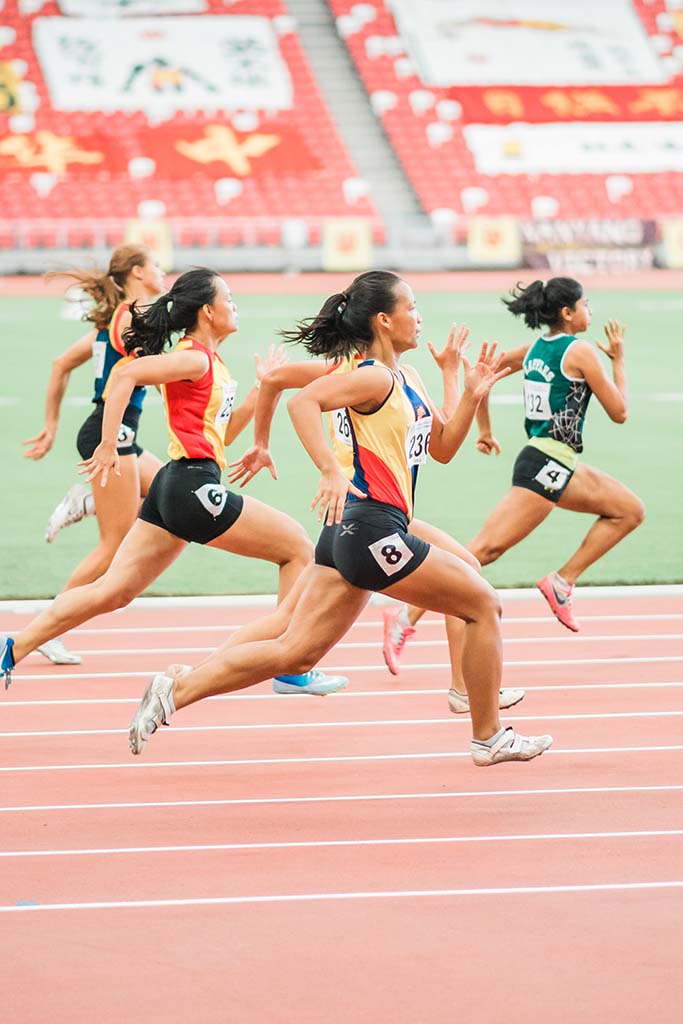This Website uses cookies to improve your visit on our website. More Info
Sports manager & sports marketing studies
- September
- 18 or 24 Months
- Duration: 3-4 semesters
- English
- Arrange consultation

DID YOU KNOW?
In 2024, Munich Business School secured the top spot among private universities of applied sciences in the field of business administration from a recruitment perspective for the fifth time in a row.
A degree in sports management offers numerous exciting prospects and opportunities. Here are six good reasons why this choice of study is worthwhile:
Sport is a global business. Major events such as the Olympic Games and world championships offer international career opportunities. A degree in sports management prepares you for working in an international environment and helps you build networks across national borders.
During your studies, you will acquire comprehensive knowledge of business studies, marketing, law, communication, and event management—specializing in the specifics of the sports industry. This broad apprenticeship also opens up career opportunities in other sectors of the economy.
Issues such as digitalization, sustainability, and e-sports are rapidly changing the world of sports. Sports managers are in demand to actively shape these trends and develop innovative solutions.
The sports industry is constantly growing—whether in professional sports, fitness and recreation, or event management. With a degree in sports management, numerous doors are open to you, e.g., at clubs, associations, agencies, or sporting goods manufacturers.
For many sports enthusiasts, sports management is the ideal way to turn their passion into a career. Those who enjoy organizing, planning, and thinking strategically can live out their enthusiasm for sports in a position of responsibility.
Many degree programs place a strong emphasis on practical experience through projects, internships, and cooperation with sports organizations. This allows you to gain valuable professional experience early on and make important contacts for your future career.
Below, you will find out what advantages MBS offers you in its sports management studies.
Below, we briefly explain what the concepts mentioned in sports management studies mean.
A degree program with an international focus prepares you for the challenges and opportunities of global markets through intercultural content, languages and often international experiences such as semesters abroad.
A business project is a real-world project in which you work in teams to analyze real business problems and develop innovative solutions, often in collaboration with a partner company.
A semester abroad allows you to study at a partner university in a foreign country, gain international experience and improve your language and intercultural skills.
Elective courses offer you the opportunity to choose the modules that match your interests and career goals, and to customize your studies. In many degree programs, you can choose more than one elective course.
A double/dual degree enables you to earn two master's degrees in just one period of study, often by spending an additional semester at a partner university abroad. This broadens both your professional qualifications and your international career opportunities.
Studying in English means that some or even all courses and exams are offered in English, which broadens international career opportunities and strengthens language skills.
Normally, final theses, such as master's theses, are written in German for German-language degree programs and in English for English-language degree programs. However, some universities offer students the option of writing their final thesis in multiple languages. At MBS, for example, you can choose whether you want to write your thesis in German or English.
A mentoring program connects you with experienced professionals or alumni who are ready to provide valuable advice, career tips, and personal support.
A pre-master's program prepares prospective students for a master's program by teaching them the basics and improving their language and subject knowledge. In particular, students who have a bachelor's degree in a different subject and want to start a master's program.
Specializations are advanced topics that you can choose within your study program to specialize in specific areas such as marketing, finance or entrepreneurship. In some programs, you can even choose more than one specialization.

The accreditations of universities or colleges are an important indicator of the quality and recognition of their study programs. Institutions such as the Science Council, the Ministry of Education, and FIBAA, as well as renowned international accreditation organizations such as AACSB and AMBA, review the academic excellence, practical orientation, and international standards of universities. Some universities, such as Munich Business School, work tirelessly to ensure that further accreditations are added and existing ones are extended. Below, we take a look at the most important accreditations for your sports management studies at Munich Business School.
| Munich Business School | Public German Universities | |
|---|---|---|
| State Accreditation | ✔️ | ✔️ |
| FIBAA | ✔️ | ❌ |
| Accreditation by the German Council of Science and Humanities | ✔️ | ✔️ |
| AACSB | ✔️ | ❌ |
| AMBA | ❌ | ❌ |
DID YOU KNOW?
Munich Business School has also won many rankings and awards. You can find an overview of these here:
All Rankings & Accreditations of MBSThese are the companies that regularly work with MBS students on projects.








At Munich Business School, you can study for a Master in Sports Management and Media. This will give you the perfect mix of business studies knowledge and sports management experience to shape your future according to your own ideas. Here are the most important facts about studying at MBS:
90
3 Semesters
English
Full-time study
Master of Arts (M.A.)
Integrated
September
Up to EUR 4,000 in funding
Sub-Modules:
Introduction to International Sports Business
------------
Sub-Modules:
Corporate Communication and Public Relations
Foundations of Communication Studies and Media Markets
Foundations of Media Law and Media Ethics
------------
Sub-Modules:
International Strategic Management
Organizational Behavior
Conscious Business
------------
Choose 1 out of 3
Gain insights into business practices and current business topics in the chosen region based on an understanding of the social background as well as the economic and political system in the respective region.
Sub-Modules:
Business Communication
Business Ethics
Negotiation Skills
-------------
Feel a stronger sense of belonging to the MBS community by actively engaging in a variety of extracurricular offerings. The module can be taken in either the 1st or 2nd semester.
Sub-Modules:
Online Marketing
Digital Sports
Social Media Management
-------------
Online Marketing
Digital Sports
Social Media Management
Sub-Modules:
Sports Marketing
Sports Sponsoring
-------------
Choose 2 of 4:
Sports Event Management
Digital Sports Management
Choose 1 out of 5:
Use case studies, business simulations, in-depth reports as well as expert knowledge to understand the complexities of the business environment in the chosen region from a cultural, economic, social, political, and legal perspective.
Sub-Modules:
Responsible Leadership
Business & Society
Master Thesis Preparation
------------
Students in the Master Sports Business and Communication gain comprehensive international experience by studying one semester at one of the numerous international partner universities of MBS. Alternatively, students can spend two semesters at selected universities and complete their studies with a dual degree.
Students who have studied at the university level or worked professionally consecutively for at least one year outside the German-speaking region can apply to replace the study abroad period in the third semester with a subject-related internship in the German-speaking region. If this is approved, an 15-week full-time internship for 15 ECTS must be completed during in the third semester.
Last but not least: writing your Master Thesis with the focus on Sports Management and Media.

"The topics and different subjects helped me with many real life examples to build up my own company meanwhile/directly after finishing my master thesis as I was able to apply my knowledge. A broad spectrum of subjects always held me staying focused, curious and eager to study."
Anna on StudyCHECK
A sports management degree program provides knowledge and skills in the field of business administration and management, specifically geared toward the sports industry. The exact course content may vary depending on the university and degree program. These are just a few general topics that may be covered in a sports management degree program. The exact structure of a sports management degree program may vary depending on the program, university, and geographical location. A practical approach, for example through internships, projects, and case studies, is often an integral part of a sports management degree program.
✓ Fundamentals of Business Studies: Introduction to the basic principles of business studies as applied to various aspects of the sports industry.
✓ Sports Economics: Analysis of economic aspects of sports, including market value analysis, financing of sports organizations, and the economic impact of sporting events.
✓ Sports Marketing: Fundamentals of marketing in the context of sports, including brand management, sponsorship, event marketing, and marketing of sports products.
✓ Sports Law: Legal aspects of sports, including contract law, sports event law, labor law in sports, and the legal framework for sports organizations.
✓ Sports Management Principles: Fundamental management concepts and practices specifically tailored to the sports industry, including organizational leadership, human resource management, and strategic management.
✓ Sports ethics and social responsibility: Examination of ethical issues in sports, fair play, social responsibility of sports organizations, and ethical decision-making.
✓ Sports event management: Planning, organizing, and executing sports events, from local games to major international events.
✓ Sports media and communication: Examination of the role of media and communication in sports, including media law, sports journalism, PR, and digital media.
✓ International sports management: Analysis of global trends and challenges in sports, international sports organizations, international business practices in sports, and cultural aspects.
✓ Sports tourism: Consideration of sports as a tourism product, event tourism in sports, and the impact of sporting events on tourism.
✓ Financial Management in Sport: Financial planning, budgeting, investment, and financial analysis in the context of sports organizations.
✓ Sports Psychology: Basic concepts of sports psychology, athlete motivation, team building, and mental training.
✓ Digital Sports Management: Integration of digital technologies and social media in sports marketing, data analysis in sports, and digital strategies for sports organizations.
✓ Sports and event law: In-depth examination of legal issues related to sporting events, including contract law, liability, and protection of trademark rights.
A degree in sports management opens up a wide range of career prospects, both in traditional sports and in related business sectors. Here are six exciting career opportunities:
In fitness studios, wellness facilities, and amusement parks, sports managers are responsible for customer management, product development, and the financial management of the businesses—a growing market that offers constantly new opportunities.
As managers or consultants for professional athletes, alumni are responsible for contract negotiations, career planning, PR work, and sponsorship deals. Communication skills and negotiation experience are particularly important here.
Cities, municipalities, and institutions employ sports managers to organize sports projects, promote physical activity, and develop infrastructure. These activities often focus on social issues such as integration, health promotion, and youth development.
Whether in professional or amateur sports, sports managers perform key tasks in the organization, marketing, sponsorship, and event management of clubs or associations. They play a crucial role in the economic and strategic development of the organization.
In specialized agencies, graduates plan and manage sporting events, sponsor appearances, and marketing campaigns. Their work ranges from designing large tournaments to brand staging in a sporting environment.
Brands such as Adidas, Nike, and Puma are looking for experts in marketing, product management, sponsorship, and sales. Here, sports managers combine business management expertise with industry knowledge.
DID YOU KNOW?
To learn more about many different careers in Business Studies, visit the following website:
Business Careers explained| Prerequisites | Salary |
|---|---|
| Entry-level positions | €30,000 – 40,000 per year |
| Mid-career level | €45,000 – 65,000 |
| Executive level | €70,000 – €120,000 |
| Industry | Industry-dependent – e.g. higher in industries such as sports goods industry |
| Location | Higher in metropolitan areas like Munich |
| Experience | In most cases, the more experience, the higher the salary |
| Qualifications | In most cases, the more qualifications, such as a DBA, the higher the salary |
DID YOU KNOW?
After an MBS Bachelor's or Master's degree, you can also take up all these professions abroad without any problems.



These figures are for guidance only and can vary widely by location and industry.
One advantage of Sports Management as a career is that there is usually a high demand for qualified professionals, especially in a world where sports are playing an increasingly important role. Another plus is that you get to experience a fast-paced, exciting industry and work with talented and passionate people.
One downside might be that competition for popular jobs in the sports industry can be very high, and it might be difficult to find a position that meets your expectations. In addition, the workday can be stressful and often requires long hours and a high degree of flexibility.
If you have an interest in sports and a talent for business and management, becoming a sports manager can be a rewarding and exciting career path. However, it is important to learn about the specific requirements and expectations of the industry and gain solid education and experience in the field to be successful. The recommended education is a Sports Management degree.

A sports management degree is an academic education that focuses on business management in the sports sector. Students learn how to successfully manage and lead sports organizations, clubs, teams and events.
The program includes a wide range of topics, such as sports marketing, sports finance, sports law, sports media, event management and sports psychology. Students also gain knowledge in areas such as human resource management, accounting and finance to ensure effective management of resources. Graduates of the sports management program have career opportunities in various areas of sports management, such as managing sports teams, organizing major sporting events, sports marketing, or marketing athletes.
The program offers students a combination of theoretical knowledge and practical experience. Internships, projects and case studies are integral parts of the program to provide students with practical experience in the industry. A successfully completed sports management degree enables graduates to become involved in an industry that is constantly evolving and is an important part of our society.
Download info material
In our exclusive and non-binding information material, you will learn everything about:

The program objective of the Masters in Sports Management is to provide students with a comprehensive understanding of the business and management of sport organizations. This includes aspects such as strategic planning, financial management, marketing, event management, human resource management and law.
Graduates of the program should be proficient in analyzing complex business problems in the sports industry and developing effective solutions. In addition, they should be able to understand and consider the needs of various stakeholders in the sports industry.
Another goal of the program is to provide students with skills in leadership, communication, teamwork, and intercultural competence. Graduates should be able to work effectively in a variety of roles and contexts around the sports industry, including sports teams, sports organizations, sports agencies and sports media.
In addition, students in the Masters in Sport Management will develop a critical perspective on the role of sport in society and the impact of sport on business and culture. They should be able to understand the importance of ethics and sustainability in the sports industry and incorporate them into their decision-making.
It is perfectly possible to study sports management without actively participating in sport yourself. Sports management is a field that focuses on the business and administrative aspects of sports, and there are many degree programs that focus on this side of sports. Here are some reasons why it is possible to study sports management without being directly involved in sport:
A sports management study program often focuses on business aspects, such as sports marketing, financial management, event management, sports law and business management. These subjects do not usually require active participation in sporting activities.
Sports management alumni can work in a variety of industries, including sports clubs, sports agencies, sports marketing agencies, event management, sports tourism, sports media and many others, without necessarily being active in sports themselves.
A sports management degree prepares students for careers in sports management, where they can work in positions such as sports manager, event manager, marketing manager, financial analyst or administrator. These roles are more about organization and administration than active participation in sport.
A sports management study program can also cover theoretical aspects of sport, such as sports psychology, sports sociology or sports history, which do not require physical participation in sport.
However, it is important to note that the exact requirements and focus may vary depending on the university and degree program. If you are interested in studying sports management without active athletic participation, you should check the specific curriculum and requirements of each university to make sure it matches your interests and career goals.
DID YOU KNOW?
Interested students who do not prefer practical sports activities can take an ideal course in sports management at Munich Business School, as the teaching is exclusively theoretical. Nevertheless, our GYM COOPERATION with FitX also offers a suitable option for those who are interested in physical activity.
A sports management qualification profile includes a combination of expertise and skills required for a successful career in the sports industry. Here are some of the most important qualifications:
✓ Business Knowledge: Successful sports managers must have an understanding of business concepts such as accounting, financial management marketing and human resource management
✓ Industry Knowledge: A comprehensive understanding of the sports industry is critical, including the rules and regulations that affect sports operations and the various stakeholders in the industry.
✓ Leadership Skills: Sports managers must be able to lead and motivate teams, make decisions and initiate change. Therefore, skills such as communication, motivation, conflict resolution and strategic thinking are fundamental.
✓ Project Management Skills: Planning, executing and monitoring complex projects to ensure they are completed on time and within budget is part of the sports manager's job profile.
✓ Analytical Skills: An understanding of data analysis, research methods, and market analysis plays a substantial role in making informed decisions in the sports industry.
✓ Creativity: Sports managers often need to find creative solutions to solve problems and identify new business opportunities. Therefore, the ability to innovate is also important.
✓ Ethics and Sustainability: An understanding of the importance of ethics and sustainability in the sports industry is essentially relevant to ensuring that sports operations are conducted in a responsible and environmentally friendly manner.
✓ Multicultural Competence: The ability to work with people from different cultures and backgrounds is of serious value to be successful in the global sports industry.
The Sports Management degree program has some definite advantages over a regular International Management degree program. Here is a comparison of the two programs:
| Sports Management | International Management | |
| Versatile | ✔ | ✔ |
| Concrete practical relevance | ✔ | ? |
| Short study time | ✔ | ✘ |
| Lots of learning material | ✘ | ✔ |
| Concrete future prospects | ✔ | ✘ |
| Turning passion into profession | ✔ | ? |
| Contact with people of similar passion | ✔ | ? |
A sports manager is responsible for the business management and administration of sports organizations, clubs, teams or events. The duties of a sports manager may include the following activities:
Managing the finances of a sports team or organization, including budgeting, financial planning and accounting, fall under the responsibility of a sports manager.
A sports manager handles the marketing and sponsorship of a sports event and team. This includes developing marketing strategies, acquiring sponsors and managing advertising campaigns.
A sports manager understands the laws and regulations associated with sporting events and organizations and ensures that they are followed.
The management of personnel, such as coaches, players or other staff, is the responsibility of a sports manager. This may include hiring, firing, or training the staff.
The organization and implementation of sports events, such as tournaments, competitions or championships, lies within the scope of a sports manager's duties.
In summary, a sports manager is responsible for ensuring that a sports team or organization is run effectively and efficiently, both on a business and sporting level. This also involves promoting the brand and reputation of the team or organization and ensuring that fans and supporters associate a positive feeling with the team.
There are many good reasons why you should study Sports Management in Munich:
The NC values for sports management studies vary annually and depend on various factors such as the number of available study places, the number of applicants and other conditions. The following is a general overview of some of the universities that offer degree programs in sports management.
| University/College | Degree Program | NC (WS 2023/24) |
|---|---|---|
| Heilbronn College | Business Administration and Culture, Leisure and Sports Management | NC 3.3 |
| University of Leipzig | Sports Management | NC 2.2 |
| Cologne Sports College | Sports Management and Sports Communication | NC 1.6 |
| Munich Business School | Master International Business: Sports Management and Media | No NC |
The Master's program in Sports Management at MBS is a one-and-a-half-year program aimed at graduates of a bachelor's program and focuses on advanced topics in sports management. The Master's program includes courses in sports marketing, sports sponsorship, sports communication and other related topics. Students are also given the opportunity to gain practical experience through internships and projects in the sports industry.
The Sports Management program at MBS is taught in English and offers students the opportunity to study in an international environment and network with other students from around the world. In addition, MBS has close relationships with several leading sports organizations and companies that provide students with access to internships and job opportunities.
Prospective students who do not want practical sports sessions will find the perfect sports management course at our university, as only theory is taught. Nevertheless, those interested in physical sports also get their money's worth through our GYM COOPERATION with FitX. MBS students receive a discount and thus have access to 7 different training areas, an individual training plan and 9 different courses and that around the clock, 365 days a year, in all FitX studios in Germany. By the way, a FitX studio is only a good 10-minute walk away from the MBS campus.
Overall, the sports management program at MBS offers students a wide range of academic courses and practical experiences that prepare them for a career in the dynamic and exciting world of sports. Moreover, trends in the world of sports, such as e-sports, sports media and virtual reality, are addressed in the sports management program. For example, an MBS alumni talks on our blog about how he rose to the management of a consulting agency for e-sports and gaming after completing his sports management studies.

The main requirement for admission to the Master International Business study program is a successful Bachelor's degree (180 ECTS or more). Applicants with a degree in Business Studies/Management/Economics are entitled to apply for the program directly, applicants without a degree in economics can qualify for the program by completing the Pre Master Program. Upon request, we will gladly verify your documents in advance. Please contact your Program Advisor.
English Proficiency
Applicants must proof their English language skills by passing one of the following language tests:
Note: If the test is also used to apply for a visa, please check the requirements of the respective embassy in advance.
Test results can only be accepted if achieved within the last two years. If you are unable to obtain your test results before handing in your MBS application, please inform us about your planned test date.
The English proficiency test can be waived by the following candidates:
